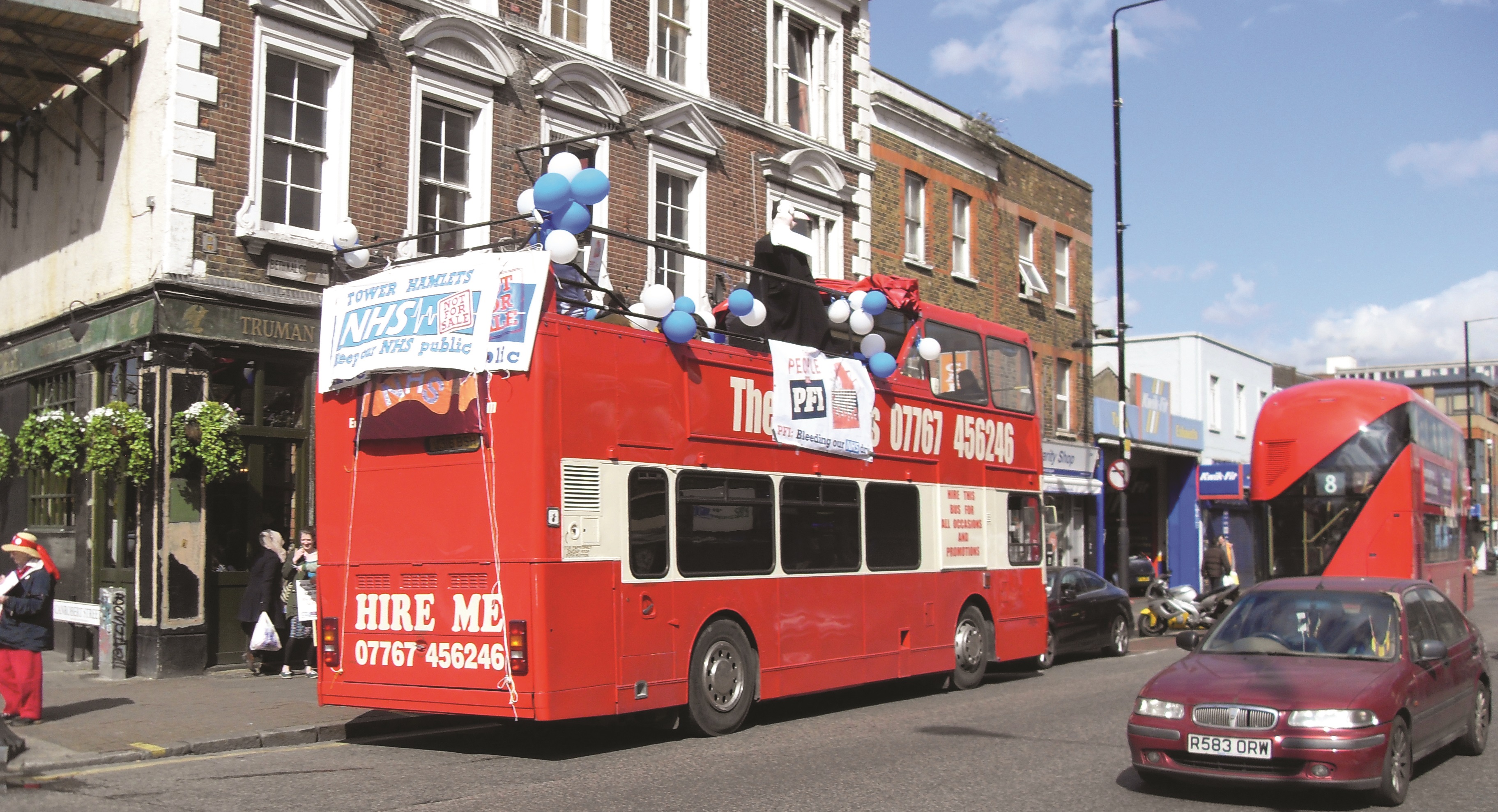Barts Health: The Real-Life Consequences of PFI in the NHS
by Carol Saunders
29 April 2015

Last weekend around 70 campaigners took part in a rolling protest through the east London boroughs of Waltham Forest, Newham and Tower Hamlets to highlight the major crisis unfolding at Barts Health NHS Trust.
The #BinBartsPFI battle bus linked networks of activists from Keep Our NHS Public, together with local political and community groups, and the People vs PFI, in a whistle-stop leafleting tour to highlight the enormous Private Finance Initiative (PFI) debt that is crippling the Trust.
Barts Health in meltdown.
Barts Health, an NHS Trust founded in 2012 and covering six hospitals, is now £93m in deficit – that’s the largest deficit in the NHS. Since the end of January, the Chief Financial Officer, Chief Executive, Chief Nurse and Chair of the Board have all resigned. The Trust is now in special measures, and an ominous pre-election silence has descended about its future.
Campaigners blame the largest PFI debt in the NHS, which is costing Barts Health £2.4m a week in unitary charges. The debt is owed to Innisfree and Skanska, the companies which constructed the Royal London Hospital in Whitechapel, as well as buildings at Newham University Hospital. Under a 40+ year contract, they are also responsible for maintenance and other services.
With repayments rising every year, the Trust will eventually pay out £7.1bn for hospitals that cost just £1.1bn to build.
Bleeding the NHS dry.
For NHS activists, PFI has shot back up the agenda in recent months. As NHS deficits grow, the role of PFI is getting clearer, and the effects are biting locally. At Barts, 220 staff (160 of them nurses) have lost their jobs in the past 18 months. Another 470 posts were down-banded, triggering a mass exodus of senior staff and soaring agency bills.
Whipps Cross Hospital occupational therapist Charlotte Monro was sacked in 2013 for ‘gross misconduct’ after speaking out about her concerns, in her role as a Unison rep, to a local authority Health Scrutiny Committee. With backing from her union and local health campaigners, she took it to an employment tribunal.
Then came a damning Care Quality Commission report on Whipps Cross – which raised all the same issues and reported serious bullying of staff. In an extraordinary turnaround, the Trust agreed to reinstate Charlotte before the tribunal’s decision could be announced.
PFI = Profit for Investors.
These stories are being repeated at hospitals across the country. But crucially, in recent months NHS activists have been moving their thinking outwards. Many are now recognising that it’s not just marketisation and privatisation that threaten the NHS. With PFI, the danger is financialisation.
With equity in NHS hospitals now trading in the secondary markets for astronomical rates of return – and with much of the proceeds being banked in tax havens – the NHS is increasingly looking like the victim of a major asset-stripping exercise.
East London health campaigners are also making the connection with what’s happening to public services all around them. When the new People vs Barts PFI group got started earlier this year, they were horrified to discover that Tower Hamlets is not just home to the new PFI-funded Royal London Hospital – it is also suffering the crippling effects of 26 PFI schools.
Demanding an end to PFI.
Mass leafleting over the past few weeks, a petition, and a day on a bus. It’s not much – but it’s a start. With none of the UK’s three main (highly implicated) political parties willing to talk about the problem, it’s going to be down to activists and the minor parties to make PFI truly toxic. Until then, campaigners across the UK will continue demanding an end to PFI debts – in the NHS and in all public services.